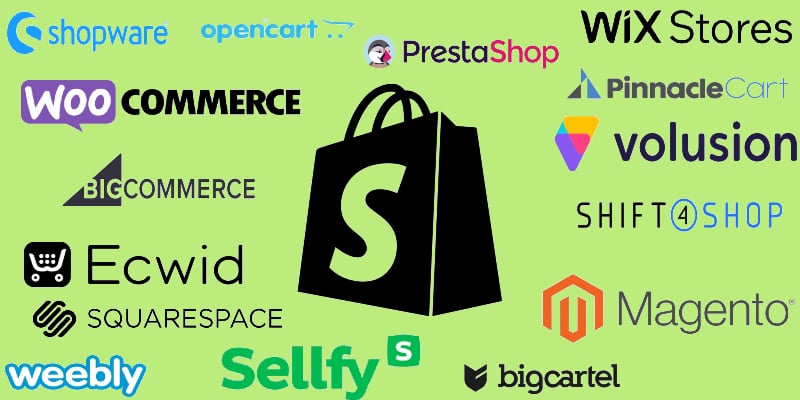Best Shopify Alternatives for Small Businesses and Growing Brands

Below, we’d like to draw your attention to some notable Shopify alternatives. While Shopify is often touted as a go-to platform for online stores, it’s not always the perfect match for every business. Beneath the intuitive Shopify admin, sleek interface, and extensive app ecosystem lie limitations that may push merchants to explore alternatives to Shopify.
We’ll guide you through a carefully curated selection of e-commerce platforms and help you determine which one best suits your business needs. Along the way, we’ll also introduce you to the challenges you might face when transitioning from Shopify to one of its alternatives — and provide practical solutions to overcome them. By the end, you’ll have a clear understanding of whether making the switch is worth it for your business. But first, let’s delve into the key reasons why many merchants consider leaving the Shopify ecosystem.

Table of contents
Why Consider Shopify Alternatives?
Let’s unpack the key reasons some entrepreneurs look beyond the e-commerce giant searching for Shopify alternatives.
- High Transaction Fees: For businesses operating on razor-thin margins, Shopify’s transaction fees can feel like an unwelcome hand in your pocket. While these fees are waived for merchants using Shopify Payments, many businesses prefer alternative payment gateways for flexibility or lower costs. The result? An extra layer of expenses that scales with your revenue, cutting into profits as your business grows.
- Limited Customization: Shopify’s user-friendly design and customizable themes are often enough for small businesses or newcomers. But for niche industries or brands with ambitious visions, the platform’s customization options can feel restrictive. Advanced coding tweaks often require hiring Shopify developers — an expensive and time-consuming proposition. If your business relies on unique workflows or bespoke features, Shopify’s limitations may stifle innovation rather than enable it.
- Costly Add-Ons: Shopify’s App Store is a double-edged sword. It offers countless tools to enhance your store, from SEO optimizers to inventory management systems. However, many of these apps come with monthly fees that can quickly add up. What starts as a reasonably priced platform can morph into a costly ecosystem as your needs evolve. Businesses seeking a more all-inclusive solution often find better value in Shopify alternatives, such as Magento with its one-time payments for third-party modules.
- Scalability Concerns: Shopify excels for small to medium-sized businesses but can become less appealing as your store scales. Enterprise-grade solutions, like Shopify Plus, aim to bridge this gap but come with a hefty price tag. For businesses experiencing rapid growth or entering global markets, platforms like Magento or BigCommerce often offer more flexibility, advanced features, and scalability without the need to entirely overhaul your operations.
Every platform comes with trade-offs, and Shopify is no exception. While it’s an excellent choice for many merchants, the platform’s limitations can make it feel more like a stepping stone than a long-term solution. Exploring alternatives to Shopify isn’t just about addressing frustrations — it’s about finding the right fit for your business, whether that means reducing costs, achieving greater customization, or preparing for the next phase of growth.
Top 15 Shopify Alternatives for Every Business
Shopify may dominate headlines, but it isn’t the only game in town. Whether you’re a small-scale seller or a scaling enterprise, there’s an abundance of Shopify alternatives, each catering to specific needs, industries, and budgets. Below, we dive into the best e-commerce platforms you can use as alternatives to Shopify, ranging from robust open-source initiatives to beginner-friendly hosted options. For clarity, we’ve also included a comparative table to help you find your perfect match.
1. Magento – Scalable & Open-Source Alternative to Shopify

Known for its scalability and open-source DNA, Magento is a powerhouse for businesses ready to customize their store down to the smallest detail.
- Notable Features: Advanced customizability, a vast extension library, and enterprise-grade scalability.
- Best For: Enterprises and tech-savvy businesses seeking complete control over their e-commerce platform.
- Advantage Over Shopify: Greater flexibility and no limits on product variations or integrations.
2. Shopware – Rising Star Among Shopify Alternatives

A rising star in European markets, Shopware blends modern design tools with an intuitive interface for a next-gen e-commerce experience.
- Notable Features: Flexible APIs, drag-and-drop editors, and strong support for multi-channel selling.
- Best For: Businesses focused on the European market or seeking advanced design options.
- Advantage Over Shopify: Lower transaction costs and advanced customization for storefront design.
3. BigCommerce – SEO-friendly & Scalable Shopify Replacement

A direct competitor to Shopify, BigCommerce stands out with its built-in SEO tools and scalability options.
- Notable Features: No transaction fees, strong SEO features, and multi-currency support.
- Best For: Medium to large businesses focusing on growth and global reach.
- Advantage Over Shopify: No need for third-party apps for SEO and advanced reporting.
4. PrestaShop – Free Open-Source Platform

As a free open-source Shopify alternative, PrestaShop allows you build an e-commerce store tailored to your vision.
- Notable Features: Huge library of free modules and a thriving global community.
- Best For: Small to medium businesses with in-house developers.
- Advantage Over Shopify: Completely free to start, with no subscription fees. More flexible in terms of customization and scalability.
5. Shift4Shop (formerly 3dcart) – Fully Hosted Shopify Alternative with Powerful Marketing Tools

A fully hosted platform with powerful marketing tools baked in, Shift4Shop is ideal for merchants who want functionality out of the box.
- Notable Features: Free with Shift4 Payments, built-in CRM, and excellent SEO tools.
- Best For: US-based businesses looking for affordability without sacrificing functionality.
- Advantage Over Shopify: Lower cost of ownership, especially for US merchants.
6. WooCommerce – Content-Focused Alternative to Shopify

WooCommerce transforms any WordPress site into a full-fledged Shopify alternative, making it a go-to for content-focused businesses.
- Notable Features: Seamless WordPress integration, unlimited customizations, and vast plugin support.
- Best For: Bloggers and small businesses familiar with WordPress.
- Advantage Over Shopify: No monthly fees; pay only for hosting and necessary plugins.
7. Ecwid – Shopify Alternative for Existing Websites

Ecwid makes integrating an online store into your existing site as painless as possible. Unlike most Shopify alternatives, it can be used combined with a non-e-commerce website that dramatically speeds up time to market.
- Notable Features: Easy site integration, free plan for small stores, and mobile app support.
- Best For: Entrepreneurs who already have a website.
- Advantage Over Shopify: A generous free plan and easy plug-and-play setup.
8. BigCartel – Most Creator-Focussed Among Shopify Alternatives

Designed with artists and creators in mind, BigCartel is simplicity at its finest.
- Notable Features: Free plan for up to five products, low-cost pricing, and artist-centric design.
- Best For: Small-scale sellers like artists and craftspeople.
- Advantage Over Shopify: Simplicity and affordability for creative entrepreneurs.
9. WixStores – Drag-and-drop Website Builder for E-Commerce

WixStores combines a drag-and-drop website builder with e-commerce functionality, perfect for design-focused users.
- Notable Features: Stunning templates, ease of use, and advanced design freedom.
- Best For: Small businesses that prioritize visual branding.
- Advantage Over Shopify: Far more beginner-friendly, with no steep learning curve.
10. OpenCart – Affordable Customization Among Shopify Alternatives

OpenCart’s open-source platform empowers businesses to create highly customizable stores at a minimal cost.
- Notable Features: Multilingual support, thousands of extensions, and no monthly fees.
- Best For: Tech-savvy businesses seeking a lightweight, free alternative.
- Advantage Over Shopify: Zero subscription costs and robust developer tools.
11. Squarespace – Visually Stunning Shopify Alternative

Well-known for its clean, visually stunning designs, Squarespace offers a blend of form and function.
- Notable Features: Award-winning templates, powerful blogging tools, and integrated e-commerce.
- Best For: Creative industries and small-scale sellers.
- Advantage Over Shopify: Superior visual design and content management.
12. PinnacleCart – Marketing-Focused Alternative to Shopify
![]()
PinnacleCart shines as a marketing-focused e-commerce platform tailored to boost conversions.
- Notable Features: SEO tools, abandoned cart recovery, and flexible payment options.
- Best For: Marketers and conversion-focused businesses.
- Advantage Over Shopify: Built-in marketing tools without requiring apps.
13. Volusion – Shopify Replacement with Advanced Analytics

An e-commerce veteran, Volusion offers advanced analytics and scalability.
- Notable Features: In-depth reporting, flexible shipping options, and CRM integration.
- Best For: Businesses that prioritize data-driven decisions.
- Advantage Over Shopify: Superior analytics and lower transaction fees.
14. Weebly – Simple & Affordable Shopify Alternative for Beginners

A simple, affordable option, Weebly makes starting an online store straightforward and painless.
- Notable Features: Affordable pricing, intuitive editor, and basic e-commerce tools.
- Best For: Beginners and small businesses with limited budgets.
- Advantage Over Shopify: Easier learning curve and significantly lower costs.
15. Sellfy – Alternative for Shopify for Digital Goods

Sellfy specializes in helping creators sell digital goods with minimal setup time.
- Notable Features: Simple interface, POD (print-on-demand) options, and robust digital product support.
- Best For: Digital product creators and print-on-demand sellers.
- Advantage Over Shopify: Tailored for digital goods without unnecessary features.
Comparison Table: Shopify Alternatives
Below, we’ve compared the top Shopify alternatives side by side, highlighting their pros, cons, advantages over Shopify, and pricing to help you make an informed decision.
| Platform | Pros | Cons | Advantages Over Shopify | Average Price |
| Magento | Highly customizable, scalable | Requires technical expertise | Flexibility, no product limits | Free (hosting costs) |
| Shopware | Advanced tools, EU-friendly | Learning curve for new users | Design and cost efficiency | €199/mo (paid) |
| BigCommerce | SEO, scalability | Higher upfront pricing | No transaction fees | $29.95–$299.95/mo |
| PrestaShop | Free, open-source | Limited support | Low cost for small businesses | Free (hosting costs) |
| Shift4Shop | Free plan with Shift4 Payments | US-centric support | Cost-effectiveness | $0–$229/mo |
| WooCommerce | WordPress integration | Plugin dependencies | No subscription fees | Free (hosting costs) |
| Ecwid | Easy integration, free plan | Limited for larger stores | Simple and affordable setup | $0–$99/mo |
| BigCartel | Free plan, artist-friendly | Limited customization | Simplicity for creators | $0–$19.99/mo |
| WixStores | Beginner-friendly, templates | Limited for larger stores | Design ease | $16–$59/mo |
| OpenCart | Lightweight, free | Developer expertise required | No subscription cost | Free (hosting costs) |
| Squarespace | Stunning designs | Limited scalability | Content and design tools | $23–$65/mo |
| PinnacleCart | Marketing-focused tools | Fewer integrations | Strong built-in features | $79.95–$199/mo |
| Volusion | Advanced analytics | Dated interface | Better reporting tools | $35–$299/mo |
| Weebly | Affordable, beginner-friendly | Basic features | Lower cost, simpler interface | $0–$29/mo |
| Sellfy | Tailored for digital goods | Limited physical product tools | Streamlined for digital sellers | $19–$99/mo |
How to Choose the Right Shopify Alternative
E-commerce platforms are not one-size-fits-all. While Shopify is a popular choice, finding the right alternative depends on understanding your business’s unique needs. Budget constraints, scalability goals, design preferences, and technical requirements all play a role in determining the best platform for you. Here’s how to navigate the maze of alternatives to Shopify and choose the one that aligns with your goals.
- Start with Your Budget: Your financial resources are a critical starting point. Shopify’s subscription model, with added costs for apps and transaction fees, can strain small budgets. Check our Shopify cost breakdown to be more informed about hidden fees. If affordability is a priority, platforms like WooCommerce (free, with hosting costs) or Shift4Shop (free with integrated payments) offer budget-friendly solutions. For businesses seeking advanced features without breaking the bank, PrestaShop or OpenCart provides powerful open-source options.
- Scalability: If your e-commerce venture has ambitious growth plans, choosing a platform that scales with you is vital. Shopify Plus offers scalability but at a premium price point. Alternatives like BigCommerce and Magento excel in handling growing product catalogs, higher traffic volumes, and advanced integrations — often at a lower total cost of ownership.
- Design Preferences: A visually stunning store can make or break your brand. While Shopify themes are customizable, platforms like Squarespace and WixStores offer unparalleled design flexibility. Their drag-and-drop editors make it easy to create a storefront that aligns with your aesthetic vision, with no coding required.
- Tech Support and Ease of Use: Some Shopify alternatives require a hands-on technical approach, while others prioritize simplicity. If you lack in-house developers, hosted solutions like Shift4Shop or Weebly are ideal for their straightforward setup and robust customer support. On the other hand, tech-savvy businesses might prefer open-source platforms like PrestaShop or OpenCart for their extensive customization capabilities.
- Flexibility and Customization: Customization can set your business apart in a crowded market. Alternatives to Shopify like Magento and WooCommerce allow extensive modification, giving you control over everything from checkout processes to unique integrations. Shopify alternatives with open-source frameworks are perfect for niche industries or businesses with specific workflows.
To zero in on the right Shopify alternative, ask these critical questions:
- What’s my immediate and long-term budget?
- How much traffic or product catalog growth do I anticipate?
- Do I need unique visual branding or basic functionality?
- Can I handle technical configurations, or do I need a plug-and-play solution?
- What features are non-negotiable for my business model?
Choosing the right Shopify alternative isn’t just about avoiding Shopify’s limitations — it’s about finding a platform that empowers your business to grow, adapt, and thrive. Whether you’re a budget-conscious entrepreneur, a creative professional, or an enterprise scaling globally, the right e-commerce solution is out there. It’s not about the “best” platform — it’s about the best one for you.
Challenges of Migrating from Shopify
Switching e-commerce platforms is a bit like moving house — it’s exciting to imagine the new possibilities, but the packing, logistics, and unforeseen obstacles can be overwhelming. For businesses leaving Shopify, the challenges of migration can seem daunting, from ensuring your data transfers seamlessly to preserving hard-earned SEO rankings. However, with the right tools and strategy, these hurdles can be navigated effectively.
1. Data Transfer: Moving the Core of Your Business
Your product catalog, customer data, and order history form the backbone of your store. Migrating this data from Shopify to another platform is rarely a straightforward process. Formats and structures differ between platforms, often requiring extensive reorganization to ensure compatibility.
Tools like Cart2Cart simplify much of the heavy lifting, automating the transfer of products, categories, and customer data. For more granular control, the offers powerful mapping features, letting you export data from Shopify into formats tailored to your chosen alternative. Its support for multiple file types ensures compatibility with platforms like Magento, Shopware, and WooCommerce.
2. Theme Incompatibility: Starting From Scratch
One of the most frustrating aspects of migrating from Shopify is that your carefully crafted store design often can’t make the journey with you. Shopify themes are proprietary and rarely compatible with other platforms, forcing businesses to rebuild their storefront from scratch.
Instead of recreating your theme pixel by pixel, consider this an opportunity to upgrade. Platforms like Squarespace and WixStores excel in drag-and-drop design, while Magento and Shopware offer unparalleled customization if you’re willing to invest in development. Many Shopify alternatives also offer theme marketplaces or developers to replicate your Shopify design while incorporating new features.
3. SEO Impact: Guarding Your Hard-Earned Rankings
Migrating a website can wreak havoc on your SEO if not handled carefully. Broken links, duplicate content, and missing metadata can all erode your search engine rankings, costing you visibility and traffic.
Possible solutions include:
- Preserve URLs: Maintain your existing URL structure wherever possible. If changes are unavoidable, implement 301 redirects to guide search engines and customers to the new location.
- Audit Metadata: Ensure titles, descriptions, and alt tags transfer correctly.
- Leverage Tools: Shopify Alternatives like BigCommerce and WooCommerce offer plugins to streamline SEO preservation. Additionally, tools like our Import & Export can help export metadata alongside your product data, ensuring nothing critical gets lost in translation.
4. Learning Curves and Hidden Costs
Moving to a new platform often means adapting to a new interface, features, and workflows. Employees must be trained, and new tools or plugins may be required to replicate Shopify’s functionality. These hidden costs can add up quickly. To mitigate their impact, consider these solutions:
- Opt for platforms with intuitive user interfaces, like WixStores or Shift4Shop, if ease of use is a priority.
- For complex Shopify Alternatives like Magento, consider engaging consultants or developers to smooth the transition.
- Build a migration budget that accounts for training, development, and potential downtime.
Final Words: Is Switching from Shopify to Its Alternatives Worth It?
E-commerce is an ever-changing game, and choosing the right platform can mean the difference between smooth growth and constant frustration. Shopify has earned its reputation as a versatile, user-friendly option, but it’s not a universal fit. The question of whether to switch from Shopify ultimately boils down to your priorities: simplicity and ease, or flexibility and long-term customization?
When Sticking with Shopify Makes Sense
For many merchants, Shopify remains a solid choice. Its intuitive interface, extensive app ecosystem, and built-in tools simplify running an online store. If your business relies on straightforward processes, or if you value time over technical tinkering, staying with Shopify may be the path of least resistance.
Ideal Scenarios to Stay with Shopify:
- Small Businesses or New Ventures: Shopify’s ease of use and robust support are perfect for entrepreneurs who are just starting out.
- Time-Strapped Merchants: With its plug-and-play setup, Shopify allows you to focus on selling rather than troubleshooting.
- Minimal Customization Needs: For businesses with generic requirements, Shopify’s existing features often suffice.
If your store works well within Shopify’s framework, the platform’s convenience and reliability might outweigh its limitations.
When Switching Is the Smarter Choice
That said, Shopify isn’t the be-all and end-all of e-commerce. For businesses pushing boundaries — whether in growth, customization, or market reach — alternatives offer unique advantages. From Magento’s limitless flexibility to BigCommerce’s enterprise-ready tools, the right platform can help you unlock new potential.
Scenarios Where Switching Wins:
- Budget Constraints: If Shopify’s monthly fees, transaction costs, and paid add-ons feel like a financial drain, platforms like WooCommerce or OpenCart may offer a cost-effective solution.
- Need for Customization: When you need features Shopify can’t provide — such as custom workflows or unique integrations — open-source platforms like Magento or PrestaShop deliver unparalleled flexibility.
- Scaling Beyond Limits: For rapidly growing businesses entering global markets, BigCommerce or Shopware provide scalability and multi-language/currency capabilities that Shopify might struggle to match.
Switching is also an opportunity to rethink your e-commerce strategy. Are you targeting new markets? Expanding your product line? Investing in omnichannel selling? These goals might be easier to achieve on a more specialized platform.
The choice between Shopify and its alternatives isn’t just about immediate functionality; it’s about where you see your business in five, ten, or even fifteen years. Shopify excels in convenience, but its limitations can surface as your business evolves. By contrast, platforms like Magento or Shopware offer room to grow — though often at the cost of complexity.
Key Questions to Ask Yourself:
- Can Shopify’s ecosystem accommodate your business as it scales?
- Are you losing revenue to transaction fees or costly add-ons?
- Does your brand need a more custom-tailored experience to stand out?
- Do you have the resources to manage a transition effectively?
In the end, there’s no one-size-fits-all answer. For some businesses, Shopify’s simplicity is an asset; for others, its limitations are a dealbreaker. The decision to switch to one of Shopify alternatives should be guided by your unique business needs, current frustrations, and future ambitions.
Switching platforms isn’t just a technical move — it’s a strategic one. Whether you stick with Shopify or leap into an alternative, the key is to ensure that your platform works for you, not against you.
Your e-commerce success depends on it.
Ready to make the move from Shopify? Transitioning to platforms like Magento, Shopware, or BigCommerce doesn’t have to be overwhelming. Our solutions are designed to simplify the migration process, ensuring your data is seamlessly transferred. Whether you’re scaling up or seeking greater customization, we’ve got the tools and expertise to make it happen. Contact us today to learn more about how we can help you take your e-commerce business to the next level.
FAQ
Is there a platform better than Shopify?
The best platform depends on your needs. Magento offers unmatched customization, BigCommerce excels in scalability, and WooCommerce is great for WordPress users. Explore Shopify alternatives to find your perfect fit.
What is Shopify’s biggest competitor?
BigCommerce is often seen as Shopify’s strongest competitor, offering similar features without transaction fees and better scalability for larger businesses.
Is there a free Shopify alternative?
Yes, platforms like WooCommerce, PrestaShop, and OpenCart are free Shopify alternatives. They require hosting but provide cost-effective solutions for small businesses.
What are Shopify disadvantages?
Shopify has limitations, including transaction fees (unless using Shopify Payments), costly add-ons, limited customization, and scalability challenges for growing businesses.
Is it hard to migrate from Shopify?
Migrating from Shopify can be challenging, especially with data transfer, theme incompatibility, and potential SEO impact. Tools like Firebear Import & Export simplify the process, making transitions to Magento, Shopware, or BigCommerce easier.









